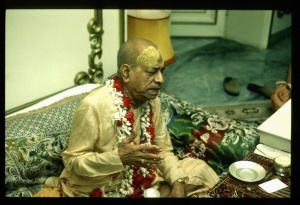CC Antya 1.35: Difference between revisions
m (1 revision(s)) |
(Vanibot #0054 edit - transform synonyms into clickable links, which search similar occurrences) |
||
| (One intermediate revision by one other user not shown) | |||
| Line 1: | Line 1: | ||
{{ | [[Category:Sri Caitanya-caritamrta - Antya-lila Chapter 01|C035]] | ||
<div style="float:left">'''[[Sri Caitanya-caritamrta|Śrī Caitanya-caritāmṛta]] - [[CC Antya|Antya-līlā]] - [[CC Antya 1|Chapter 1: Śrīla Rūpa Gosvāmī's Second Meeting With the Lord]]'''</div> | |||
<div style="float:right">[[File:Go-previous.png|link=CC Antya 1.34|Antya-līlā 1.34]] '''[[CC Antya 1.34|Antya-līlā 1.34]] - [[CC Antya 1.36|Antya-līlā 1.36]]''' [[File:Go-next.png|link=CC Antya 1.36|Antya-līlā 1.36]]</div> | |||
{{CompareVersions|CC|Antya 1.35|CC 1975|CC 1996}} | |||
{{RandomImage}} | |||
==== TEXT 35 ==== | ==== TEXT 35 ==== | ||
<div class="verse"> | |||
<div | :vṛndāvane nāṭakera ārambha karilā | ||
vṛndāvane nāṭakera ārambha karilā | :maṅgalācaraṇa ‘nāndī-śloka’ tathāi likhilā | ||
maṅgalācaraṇa ‘nāndī-śloka’ tathāi likhilā | |||
</div> | </div> | ||
| Line 13: | Line 16: | ||
==== SYNONYMS ==== | ==== SYNONYMS ==== | ||
<div class="synonyms"> | |||
<div | ''[//vanipedia.org/wiki/Special:VaniSearch?s=vṛndāvane&tab=syno_o&ds=1 vṛndāvane]'' — at Vṛndāvana; ''[//vanipedia.org/wiki/Special:VaniSearch?s=nāṭakera&tab=syno_o&ds=1 nāṭakera]'' — of the drama; ''[//vanipedia.org/wiki/Special:VaniSearch?s=ārambha&tab=syno_o&ds=1 ārambha]'' — the beginning; ''[//vanipedia.org/wiki/Special:VaniSearch?s=karilā&tab=syno_o&ds=1 karilā]'' — wrote; ''[//vanipedia.org/wiki/Special:VaniSearch?s=maṅgalācaraṇa&tab=syno_o&ds=1 maṅgalācaraṇa]'' — invoking auspiciousness; ''[//vanipedia.org/wiki/Special:VaniSearch?s=nāndī&tab=syno_o&ds=1 nāndī]-[//vanipedia.org/wiki/Special:VaniSearch?s=śloka&tab=syno_o&ds=1 śloka]'' — introductory verse; ''[//vanipedia.org/wiki/Special:VaniSearch?s=tathāi&tab=syno_o&ds=1 tathāi]'' — there; ''[//vanipedia.org/wiki/Special:VaniSearch?s=likhilā&tab=syno_o&ds=1 likhilā]'' — he wrote. | ||
</div> | </div> | ||
| Line 21: | Line 23: | ||
==== TRANSLATION ==== | ==== TRANSLATION ==== | ||
<div class="translation"> | |||
<div | |||
In Vṛndāvana, Rūpa Gosvāmī began to write a drama. In particular, he composed the introductory verses to invoke good fortune. | In Vṛndāvana, Rūpa Gosvāmī began to write a drama. In particular, he composed the introductory verses to invoke good fortune. | ||
</div> | </div> | ||
| Line 28: | Line 29: | ||
==== PURPORT ==== | ==== PURPORT ==== | ||
<div class="purport"> | |||
Śrīla Bhaktisiddhānta Sarasvatī Ṭhākura quotes from the ''Nāṭaka-candrikā'', wherein it is written: | |||
:''prastāvanāyās tu mukhe nāndī kāryā śubhāvahā'' | |||
:''āśīr-namaskriyā-vastu-nirdeśānyatamānvitā'' | |||
:''aṣṭābhir daśabhir yuktā kiṁ vā dvādaśabhiḥ padaiḥ'' | |||
:''candra-nāmāṅkitā prāyo maṅgalārtha-padojjvalā'' | |||
:''maṅgalaṁ cakra-kamala-cakora-kumudādikam'' | |||
Similarly, in the Sixth Chapter of the ''Sāhitya-darpaṇa'', text 282, it is said: | |||
: | |||
:''āśīr-vacana-saṁyuktā stutir yasmāt prayujyate'' | |||
:''deva-dvija-nṛ-pādīnāṁ tasmān nāndīti saṁjñitā'' | |||
The introductory portion of a drama, which is written to invoke good fortune, is called ''nāndī-śloka''. | |||
</div> | |||
<div style="float:right; clear:both;">[[File:Go-previous.png|link=CC Antya 1.34|Antya-līlā 1.34]] '''[[CC Antya 1.34|Antya-līlā 1.34]] - [[CC Antya 1.36|Antya-līlā 1.36]]''' [[File:Go-next.png|link=CC Antya 1.36|Antya-līlā 1.36]]</div> | |||
</div> | __NOTOC__ | ||
__NOTOC__ | __NOEDITSECTION__ | ||
Latest revision as of 19:28, 19 February 2024

His Divine Grace
A.C. Bhaktivedanta Swami Prabhupada
A.C. Bhaktivedanta Swami Prabhupada
TEXT 35
- vṛndāvane nāṭakera ārambha karilā
- maṅgalācaraṇa ‘nāndī-śloka’ tathāi likhilā
SYNONYMS
vṛndāvane — at Vṛndāvana; nāṭakera — of the drama; ārambha — the beginning; karilā — wrote; maṅgalācaraṇa — invoking auspiciousness; nāndī-śloka — introductory verse; tathāi — there; likhilā — he wrote.
TRANSLATION
In Vṛndāvana, Rūpa Gosvāmī began to write a drama. In particular, he composed the introductory verses to invoke good fortune.
PURPORT
Śrīla Bhaktisiddhānta Sarasvatī Ṭhākura quotes from the Nāṭaka-candrikā, wherein it is written:
- prastāvanāyās tu mukhe nāndī kāryā śubhāvahā
- āśīr-namaskriyā-vastu-nirdeśānyatamānvitā
- aṣṭābhir daśabhir yuktā kiṁ vā dvādaśabhiḥ padaiḥ
- candra-nāmāṅkitā prāyo maṅgalārtha-padojjvalā
- maṅgalaṁ cakra-kamala-cakora-kumudādikam
Similarly, in the Sixth Chapter of the Sāhitya-darpaṇa, text 282, it is said:
- āśīr-vacana-saṁyuktā stutir yasmāt prayujyate
- deva-dvija-nṛ-pādīnāṁ tasmān nāndīti saṁjñitā
The introductory portion of a drama, which is written to invoke good fortune, is called nāndī-śloka.